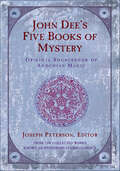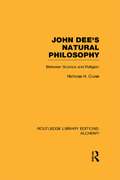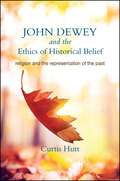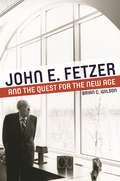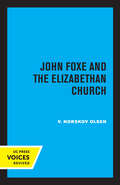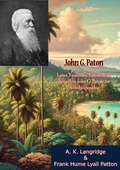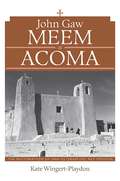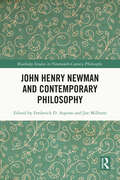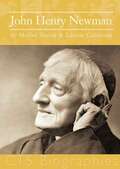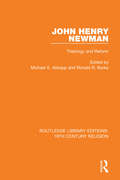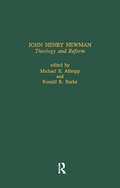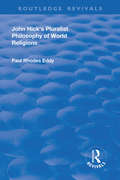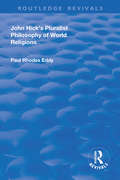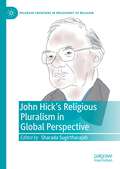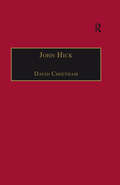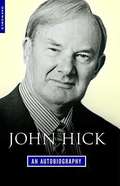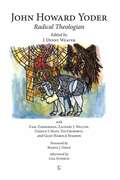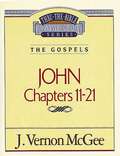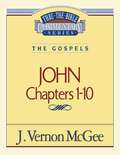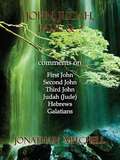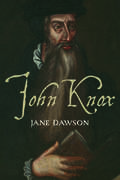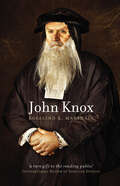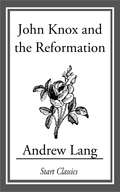- Table View
- List View
John Dee's Conversations with Angels
by Deborah E. HarknessJohn Dee's angel conversations have been an enigmatic facet of Elizabethan England's most famous natural philosopher's life and work. Professor Harkness contextualizes Dee's angel conversations within the natural philosophical, religious and social contexts of his time philosophy, and the apocalypse, and argues that they represent a continuing development of John Dee's earlier concerns and interests. These conversations include discussions of the natural world, the practice of natural philosophy, and the apocalypse.
John Dee's Five Books of Mystery: Original Sourcebook of Enochian Magic
by Joseph H. PetersonDiscovered in a hidden compartment of an old chest long after his death, the secret writings of John Dee, one of the leading scientists and occultists of Elizabethan England, record in minute detail his research into the occult. Dee concealed his treatises on the nature of humankind's contact with angelic realms and languages throughout his life, and they were nearly lost forever. In his brief biography of John Dee, Joseph Peterson calls him a "true Renaissance man" -- detailing his work in astronomy, mathematics, navigation, the arts, astrology, and the occult sciences. He was even thought to be the model for Shakespeare's Prospero.All this was preparation for Dee's main achievement: five books, revealed and transcribed between March 1582 and May 1583, bringing to light mysteries and truths that scholars and adepts have been struggling to understand and use ever since. These books detail his system for communicating with the angels, and reveal that the angels were interested in and involved with the exploration and colonization of the New World, and in heralding in a new age or new world order. While Dee's influence was certainly felt in his lifetime, his popularity has grown tremendously since. His system was used and adapted by the Hermetic Order of the Golden Dawn, and subsequently by Aleister Crowley.This new edition of John Dee's Five Books of Mystery is by far the most accessible and complete published to date. Peterson has translated Latin terms and added copious footnotes, putting the instructions and references into context for the modern reader.
John Dee's Natural Philosophy: Between Science and Religion (Routledge Library Editions: Alchemy)
by Nicholas CluleeThis is the definitive study of John Dee and his intellectual career. Originally published in 1988, this interpretation is far more detailed than any that came before and is an authoritative account for anyone interested in the history, literature and scientific developments of the Renaissance, or the occult. John Dee has fascinated successive generations. Mathematician, scientist, astrologer and magus at the court of Elizabeth I, he still provokes controversy. To some he is the genius whose contributions to navigation made possible the feats of Elizabethan explorers and colonists, to others an alchemist and charlatan. Thoroughly examining Dee’s natural philosophy, this book provides a balanced evaluation of his place, and the role of the occult, in sixteenth-century intellectual history. It brings together insights from a study of Dee’s writings, the available biographical material, and his sources as reflected in his extensive library and, more importantly, numerous surviving annotated volumes from it.
John Dewey and the Ethics of Historical Belief: Religion and the Representation of the Past
by Curtis HuttJohn Dewey and the Ethics of Historical Belief addresses the ethics of the representation of the past with a focus on the justification of historical belief within religious and critical historiographical traditions. What makes a belief about the past justified? What makes one historical belief preferable to another? A great deal rides on how these questions are answered. History textbook wars take place across the globe, from California to India. Cultural heritage protection is politicized and historical research is commonly deployed in support of partisan agendas.This book explores not only John Dewey's relatively unknown contribution to this topic, but also the leading alternatives to his approach. Author Curtis Hutt focuses attention on the debate among those most influenced by Dewey's thought, including Richard Rorty, Richard Bernstein, James Kloppenberg, Wayne Proudfoot, and Jeffrey Stout. He also reviews the seminal work of Van Harvey on the relationship between historians and religious believers. Dewey is cast as a vigorous opponent of those who argue that justified historical belief depends upon one's religious tradition. Strongly resisted is the idea that historical belief can be justified simply on account of acculturation. Instead, Dewey's view that beliefs are justified as a result of theorized historical inquiry is emphasized. In order to prevent moral blindness, the responsible historian and theologian alike are advised to attend to witnesses to the past that arise from outside of their own traditions.
John E. Fetzer and the Quest for the New Age (Great Lakes Books Series)
by Brian C. WilsonJohn E. Fetzer and the Quest for the New Age follows the spiritual sojourn of John E. Fetzer, a Michigan business tycoon. Born in 1901 and living most of his life in Kalamazoo, Fetzer parlayed his first radio station into extensive holdings in broadcasting and other enterprises, leading to his sole ownership of the Detroit Tigers in 1961. By the time he died in 1991, Fetzer had been listed in Forbes magazine as one of the four hundred wealthiest people in America. And yet, business success was never enough for Fetzer—his deep spiritual yearnings led him from the Christianity of his youth to a restless exploration of metaphysical religions and movements ranging from Spiritualism, Theosophy, Freemasonry, UFOology, and parapsychology, all the way to the New Age as it blossomed in the 1980s. Author Brian C. Wilson demonstrates how Fetzer’s quest mirrored those of thousands of Americans who sought new ways of thinking and being in the ever-changing spiritual movements of the twentieth century. Over his lifetime, Fetzer's worldview continuously evolved, combining and recombining elements from dozens of traditions in a process he called "freedom of the spirit." Unlike most others who engaged in a similar process, Fetzer’s synthesis can be documented step by step using extensive archival materials, providing readers with a remarkably rich and detailed roadmap through metaphysical America. The book also documents how Fetzer’s wealth allowed him to institutionalize his spiritual vision into a thriving foundation—the Fetzer Institute—which was designed to carry his insights into the future in hopes that it would help catalyze a global spiritual transformation. John E. Fetzer and the Quest for the New Age offers a window into the rich and complex history of metaphysical religions in the Midwest and the United States at large. It will be read with interest by those wishing to learn more about this enigmatic Michigan figure, as well as those looking for an engaging introduction into America’s rapidly shifting spiritual landscape.
John Foxe and the Elizabethan Church
by V. Norskov OlsenThis title is part of UC Press's Voices Revived program, which commemorates University of California Press’s mission to seek out and cultivate the brightest minds and give them voice, reach, and impact. Drawing on a backlist dating to 1893, Voices Revived makes high-quality, peer-reviewed scholarship accessible once again using print-on-demand technology. This title was originally published in 1973.
John G. Lake: His Life, His Sermons, His Boldness
by Kenneth Copeland PublicationsCollected sermons, poems, and writings of DR. John G. Lake. Well known healer and evangelist of the early 20th century.
John G. Paton: Later Years and Farewell: A Sequel to John G. Paton, an Autobiography
by A. K. Langridge Frank Hume Lyall PattonJohn G. Paton: Later Years and Farewell is a heartfelt continuation of the life story of John G. Paton, the renowned Scottish missionary to the New Hebrides (modern-day Vanuatu). Co-authored by A. K. Langridge and Frank Hume Lyall Patton, this sequel builds upon Paton’s earlier autobiography, focusing on the final chapter of his extraordinary life of service, faith, and dedication to the mission field.The book provides an in-depth look at Paton’s later missionary efforts, documenting his relentless advocacy for the people of the New Hebrides and his tireless work to secure support from churches and governments. Despite advancing age, Paton continued to travel extensively, sharing his experiences, raising funds, and inspiring others to join the cause of spreading the Gospel. Langridge and Patton offer a vivid portrait of a man whose faith and passion for mission work remained undiminished, even in his twilight years.Alongside Paton’s public ministry, the book reflects on his personal joys and struggles, including the challenges of health, family, and the complexities of working across cultural divides. The narrative celebrates the lasting impact of Paton’s mission, highlighting the transformation of the New Hebrides communities from hostility toward Christianity to embracing the faith.The authors provide a fitting farewell, capturing the legacy of Paton’s lifelong commitment to his calling and the profound influence he left on both the island communities and the global missionary movement. John G. Paton: Later Years and Farewell is not only a tribute to a remarkable life but also an inspiring reminder of the power of faith, perseverance, and service.For readers of Christian biography, missionary history, or those following the life of John G. Paton, this book offers a moving and enriching conclusion to the story of one of the 19th century’s most influential missionaries.
John Gaw Meem at Acoma: The Restoration of San Esteban del Rey Mission
by Kate Wingert-PlaydonBuilt by Spanish Franciscan missionaries in the seventeenth century, the magnificent mission church at Acoma Pueblo in west-central New Mexico is the oldest and largest intact adobe structure in North America. But in the 1920s, in danger of becoming a ruin, the building was restored in a cooperative effort among Acoma Pueblo, which owned the structure, and other interested parties. Kate Wingert-Playdon&’s narrative of the restoration and the process behind it is the only detailed account of this milestone example of historic preservation, in which New Mexico&’s most famous architect, John Gaw Meem, played a major role.
John Henry Newman and Contemporary Philosophy (Routledge Studies in Nineteenth-Century Philosophy)
by Frederick D. Aquino Joe MilburnWhile John Henry Newman’s writings have long received the attention of historians, theologians, and literary critics, they have largely been neglected by philosophers. However, Newman’s importance as a philosopher is just now beginning to be acknowledged.This volume brings together leading philosophers and Newman scholars to explore the contours of his philosophical thought and to show its relevance to contemporary philosophy. The chapters explore, develop, and evaluate Newman’s thought, considering recent work in epistemology, philosophy of religion, moral philosophy, and philosophy of education.John Henry Newman and Contemporary Philosophy will be of interest to scholars and advanced students interested in nineteenth-century philosophy, philosophy of religion, epistemology, moral philosophy, philosophy of education, and nineteenth-century religious thought.
John Henry Newman: Apostle To The Doubtful (Cts Biographies Ser.)
by Meriol Trevor Leonie CaldecottEminent Victorian academic and thinker, Anglican clergyman and celebrated convert, caring pastor and writer, Catholic priest, and Cardinal - these are some of the signposts along John Henry Newmans celebrated journey. This biography reveals a compassionate man who was much more than a writer and polemicist. As a pastor, priest, and friend, he offered lasting counsel to many and lived out the demands of the gospel.
John Henry Newman: Theology and Reform (Routledge Library Editions: 19th Century Religion #2)
by Michael E. Allsopp Ronald R. BurkeThis collection of papers, first published in 1992, grew out of a concern for the perduring nature of the thought of John Henry Cardinal Newman. Although Cardinal Newman died over one hundred years ago, his influence on today’s thinking is still strong. Newman put forward an ideal of society and life which has a recognizable relation to the lasting possibilities open to humankind. The editors and contributors of this volume have been brought together by a common interest in a man for whom the continual search for truth is paramount.
John Henry Newman: Theology and Reform (Routledge Library Editions: 19th Century Religion Ser. #2)
by Michael E. Allsopp Ronald R. BurkeThis collection of papers grew out of a concern of several at Creighton University for the perduring nature of the thought of John Henry Cardinal Newman. Although Cardinal Newman died some one hundred years ago, his influence on today’s thinking is still strong. Like Sir Thomas More with his Utopia, Newman put forward an ideal of society and life which has a recognizable relation to the lasting possibilities open to humankind. First published in 1992. Routledge is an imprint of Taylor & Francis, an informa company.
John Hick's Pluralist Philosophy of World Religions
by Paul Rhodes EddyThis title was first published in 2002. One of the most fascinating and controversial interpretations of religious diversity is 'religious pluralism.' According to John Hick's model of religious pluralism, all the world's great religions are equally valid ways of understanding and responding to the ultimate spiritual reality. This book offers an exposition of, and critical response to, John Hick's model. Introducing the various interpretations of religious diversity being discussed today, this book presents constructive suggestions as to how things could be further developed to offer a more accurate, less confusing presentation of the various options in theology of religions. The standard threefold typology of responses to religious diversity - exclusivism, inclusivism, and pluralism - are explained and defended. Hick's pluralist interpretation of religious diversity is traced, culminating in a critical assessment of Hick's pluralistic model and an up-to-date summary of a variety of critiques directed toward Hick's proposal.
John Hick's Pluralist Philosophy of World Religions
by Paul Rhodes EddyThis title was first published in 2002. One of the most fascinating and controversial interpretations of religious diversity is 'religious pluralism.' According to John Hick's model of religious pluralism, all the world's great religions are equally valid ways of understanding and responding to the ultimate spiritual reality. This book offers an exposition of, and critical response to, John Hick's model. Introducing the various interpretations of religious diversity being discussed today, this book presents constructive suggestions as to how things could be further developed to offer a more accurate, less confusing presentation of the various options in theology of religions. The standard threefold typology of responses to religious diversity - exclusivism, inclusivism, and pluralism - are explained and defended. Hick's pluralist interpretation of religious diversity is traced, culminating in a critical assessment of Hick's pluralistic model and an up-to-date summary of a variety of critiques directed toward Hick's proposal. Paul Rhodes Eddy concludes that Hick's present model is ultimately unsuccessful in retaining both of his long-cherished goals, a robust religious realism and a consistent religious pluralism, whilst overcoming the most difficult problem for the pluralist, the fact that the world's religions understand the divine in often contradictory ways.
John Hick's Religious Pluralism in Global Perspective (Palgrave Frontiers in Philosophy of Religion)
by Sharada SugirtharajahThis volume contains fresh scholarly contributions to mark the birth centenary of John Hick, the internationally well-known philosopher of religion, whose works continue to have significant global relevance in today’s religiously diverse and conflict-ridden world. His writings have reset the parameters of religious pluralism. Up till now, Hick’s religious pluralism has been mainly seen in relation to the Western context where Christianity is the predominant religion. This volume includes both Western and non-Western engagement with his thinking in contexts such as Japan, China, Korea, Nigeria, and India, where Christianity is a minority religion with little political power. Its distinctiveness lies in widening the debate on religious pluralism by bringing Hick’s pluralistic hypothesis into a constructive cross-cultural and interreligious conversation with scholars of Hinduism, Jainism, Daoism, Judaism, Christianity, Islam and African traditional religions. In doing so, this collection examines how Hick’s philosophy of religious pluralism has been received, appropriated and appraised by these scholars. It has been appreciated and critiqued in equal measure, and continues to impact on current thinking on religious pluralism. This volume makes a significant contribution to the debate initiated by Hick.
John Hick: A Critical Introduction and Reflection
by David CheethamJohn Hick is considered to be one of the greatest living philosophers of religion. Hick's philosophical journey has culminated in the grand proposal that we should see all the major world religions as equally valid responses to the same ultimate reality (the 'Real'). This book presents a critical introduction to John Hick's speculative theology and philosophy. The book begins where Hick began, with the problems of religious language, and ends where Hick is now, exploring the questions of religious plurality. Incorporating early aspects that Hick himself would now wish to qualify, as well as explanations that reflect Hick's present focus, Cheetham offers some speculative reflections of his own on key topics, highlighting Hick's influence on contemporary theology and philosophy of religion. All those studying the work of this great philosopher and theologian will find this new introduction offers an invaluable overview along with fresh critical insight.
John Hick: An Autobiography
by John HickFrom his early conversion to evangelical Christianity to his role as a conscientious objector in World War II and his move towards religious pluralism, this book will be core reading for many courses taught on John Hick around the country.
John Howard Yoder: Radical Theologian
by J Denny Weaver'John Howard Yoder: Radical Theologian' shows that for John Howard Yoder both theology (in particular Christology) and ethics are expressions of the meaning of the narrative of Jesus. All such statements are relative to a particular context, so thattheology and ethics are subject to reaching back to the narrative in order to restate the meaning in new and ever-changing contexts. This methodology is visible in Yoder's 'Preface to Theology', which has been little used in most treatments of Yoder's thought. Yoder has been characterised as standing on Nicene orthodoxy, criticised for rejecting Nicene orthodoxy, called heterodox, and designated a postmodern thinker to be interpreted in terms of other such thinkers. None of these characterisations adequately locates the basis of his methodology in the narrative of Jesus. Thus 'John Howard Yoder: Radical Theologian' aims to go beyond or to supersede existing treatments with its demonstration that Yoder is a radical theologian in the historical meaning of radical - that is, as one who returns to the root - but also relates his theology to the personal accusations that clouded his later years. For Christian faith, this root is Christ. Parts II and III of the book explore the sources of Yoder's approach, and its application in several contemporary contexts.
John I: John, Chapters 11-21 (Thru the Bible)
by Vernon McgeeRadio messages from J. Vernon McGee delighted and enthralled listeners for years with simple, straightforward language and clear understanding of the Scripture. Now enjoy his personable, yet scholarly, style in a 60-volume set of commentaries that takes you from Genesis to Revelation with new understanding and insight. Each volume includes introductory sections, detailed outlines and a thorough, paragraph-by-paragraph discussion of the text. A great choice for pastors - and even better choice for the average Bible reader and student! Very affordable in a size that can go anywhere, it's available as a complete 60-volume series, in Old Testament or New Testament sets, or individually.
John I: The Gospels (Thru the Bible #38)
by J. Vernon McgeeRadio messages from J. Vernon McGee delighted and enthralled listeners for years with simple, straightforward language and clear understanding of the Scripture. Now enjoy his personable, yet scholarly, style in a 60-volume set of commentaries that takes you from Genesis to Revelation with new understanding and insight. Each volume includes introductory sections, detailed outlines and a thorough, paragraph-by-paragraph discussion of the text. A great choice for pastors - and even better choice for the average Bible reader and student! Very affordable in a size that can go anywhere, it's available as a complete 60-volume series, in Old Testament or New Testament sets, or individually.
John Judah Paul & ?
by Jonathan MitchellA VALUABLE COMPANION to your study and understanding a! the Scriptures, this collection unlocks every word, every verse and every paragraph to uncover the original thought and intent of God '5 Word. The interpretation and comments on the letters of J0hn Judah Paul and the letter to the Hebrews are based upon the New Testament translation by the author and roe-examines the essential messages of the New Covenant, the preeminence of Christ, the truth of love, the better promises. the freedom from bondage, and the God-gifted power of grace over law Drawing upon years of meticulous research of multiple texts and resources this work IS intended to shed new light based upon a correct understanding of the Greek texts Within the perspective of the local life situations and their first century contexts, and equally important, to serve as a catalyst for critical thinking regarding the impact of these letters upon our lives today. Inside you will find: * A word-based translation * Multiple renderings of the Greek texts * A historical-critical approach * Critical attention to the significance of the Greek verb tenses * Significance of optional case functions of nouns * A concise introduction to each letter * Alternate renderings parenthetically inserted in lightface * Multiple references to other New Testament letters and the tow gospels * Additional quotes cited from various commentators * Verses presented in bold face for easy reading For readers worldwide - pastors teachers students and study groups this extensive verse-by-verse commentary expresses the transformative power of the continuously active and luring word. About the Author JONATHAN MITCHELL IS a speaker teacher and translator of the Greek New Testament He is the author of THE NEW TESTAMENT, God's Message of Goodness Ease and Well-being Which Brings God's Grits of His Spin! His Life, His Grace, His Power. His Fairness. His Peace and His Love; and Peter, Paul and Jacob Comments on First Peter, Philippians, Colossians, First Thessalonians Second Thessalonians, First Timothy, Second Timothy, Titus, Jacob (James). He holds a master's degree in Anthropology from Northern Arizona University and resides With his family in Arizona.
John Knox
by Jane DawsonJane Dawson has written the definitive life of John Knox, a leader of the Protestant Reformation in sixteenth-century Scotland. Based in large part on previously unavailable sources, including the recently discovered papers of Knox's close friend and colleague Christopher Goodman, Dawson's biography challenges the traditionally held stereotype of this founder of the Presbyterian denomination as a strident and misogynist religious reformer whose influence rarely extended beyond Scotland. She maintains instead that John Knox relied heavily on the support of his "godly sisters" and conferred as well as argued with Mary, Queen of Scots. He was a proud member of the European community of Reformed Churches and deeply involved in the religious Reformations within England, Ireland, France, Switzerland, and the Holy Roman Empire. Casting a surprising new light on the public and private personas of a highly complex, difficult, and hugely compelling individual, Dawson's fascinating study offers a vivid, fully rounded portrait of this renowned Scottish preacher and prophet who had a seismic impact on religion and society.
John Knox
by Rosalind K. MarshallA bestselling biography of one of the Reformations&’ central characters from the author of Mary Queen of Scots: Truth or Lies. Following John Knox&’s career in Scotland, England, France, Switzerland, and Germany, Rosalind K. Marshall explains in straightforward terms the issues and beliefs which concerned the theologian so deeply. She also focuses on his relationship with the opposite sex, discussing the notorious First Blast of the Trumpet against the Monstrous Regiment of Women, his dealings with Mary, Queen of Scots, and the patient, revealing letters he wrote his mother-in-law. This book untangles truth from mythology in the life of this strange, complex, and determined man and constructs a balanced picture of sixteenth-century Scotland that places Knox clearly within the context of change and reformation which was sweeping the whole of Europe. The result is a richer and more complex portrayal of both Scotland and Knox than any hitherto available, and the first modern paperback of one of the most famous of all Scottish figures. Praise for John Knox and the books of Rosalind K. Marshall &“A rare gift to the reading public.&” —International Review of Scottish Studies &“An admirable new biography . . . a remarkable study, illuminating both a character and an age.&” —Antonia Fraser, award-winning author of Cromwell, on Mary of Guise &“Dr Marshall . . . uses exactly the right mixture of flowing, readable narrative . . . to breathe life into the historical dust.&” —Jack Firth on Bonnie Prince Charlie
John Knox and the Reformation
by Andrew LangAndrew Lang (1844-1912) was a prolific Scots man of letters, a poet, novelist, literary critic and contributor to anthropology. He now is best known as the collector of folk and fairy tales. He was educated at the Edinburgh Academy, St Andrews University and at Balliol College, Oxford. As a journalist, poet, critic and historian, he soon made a reputation as one of the ablest and most versatile writers of the day. Lang was one of the founders of the study of "Psychical Research," and his other writings on anthropology include The Book of Dreams and Ghosts (1897), Magic and Religion (1901) and The Secret of the Totem (1905). He was a Homeric scholar of conservative views. Other works include Homer and the Epic (1893); a prose translation of The Homeric Hymns (1899), with literary and mythological essays in which he draws parallels between Greek myths and other mythologies; and Homer and his Age (1906). He also wrote Ballades in Blue China (1880) and Rhymes la Mode (1884).

